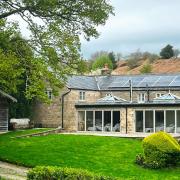Ian McMillan is talking to me on the move. For a fleeting moment - when I ring the Yorkshire-born poet, writer and BBC broadcaster on his mobile phone - I imagine him sitting in the back of a chauffeur driven limo with a retinue of PR advisers, heading to a pitch meeting with a Radio Three producer at a north London cafe.
This being McMillan, however, the truth is a lot more down-to-earth. 'I’m waiting for a bus at the moment,' he says in his deep, instantly recognisable South Yorkshire rumble. 'The X19 from Barnsley to Doncaster.' Pause. 'Hold on. It’s ‘ere. Keep talkin’, though.'
There’s a short delay while he gets on board ('I’m just going to show the driver my elderly man’s bus pass') and finds a seat. He’s off to host a writing workshop, so is going somewhere with a purpose; although he laughs and says that he wouldn’t mind 'being one those old blokes who just go ‘round and ‘round on the bus.'
Actually, if truth be told, McMillan, aka The Bard of Barnsley, hasn’t got time to be aimless, even though he describes himself as 'semi-retired'. He’s still writing books, poems and scripts, is involved in community art work and pops up occasionally on TV (although his television appearances are less frequent these days). His ‘memoir of a childhood and the sea’, called My Sand Life, My Pebble Life, was published last year.

Anchoring all of these disparate interests is the acclaimed Radio Three show The Verb, which the BBC describes as ‘a cabaret of the word, featuring the best poetry, new writing and performance.’ McMillan has been its host for the last 21 years. 'The Verb carries on, which is great,' he says. 'We’ve got a new boss at Radio Three (Sam Jackson was announced as Controller in January), which always makes you a bit nervous, but he likes us. So that’s good. I’m doing a live version of the show from Leeds this Friday.'
It’s proof, if proof be needed, that McMillan never strays far from his Yorkshire roots. Which brings us to his latest big project: an adaptation of Rossini’s The Barber of Seville, which opens the first-ever Bradford Opera Festival this month. The production features the Yorkshire Symphony Orchestra and Bradford Festival Choral Society, and the cast includes international baritone Oscar Castellino as Figaro; mezzo-soprano Felicity Buckland as Rosina; Shipley tenor Joseph Doody as Count Almaviva; Bradford bass baritone Julian Close as Basilio; and Ukrainian-born, Bradford-based soprano Milana Sarukhanyan as Bertha. The difference is that McMillan has changed the libretto into Yorkshire dialect.
It’s not the first time he’s been involved with this particular musical art form. He wrote the librettos for two operas — one called Ice Cream: The Opera (described as ‘Romeo and Juliet with ice cream cones’) and another called The Arsonists — which were also performed in Yorkshire accents. 'I did them because I wanted to explore if the long operatic note could be sung in Yorkshire dialect, despite our clipped vowels,” he explains. “And in the end I discovered that it kind of can.'
Adapting The Barber of Seville was an entirely new challenge, however, because... well, it’s Rossini, and the standard English translation of the libretto already exists. For a moment, it seems as though McMillan is about to gloss over how fiendishly difficult his job was. But only for a moment. 'The words of the standard English translation fit the tunes exactly,' he says. 'So putting it into Yorkshire dialect was hard because I couldn’t add anything or take anything away. If I tried to add a syllable here and there for a good gag, it just didn’t work. It was a bit like doing a crossword. What I wrote had to fit the existing template exactly.'
For example, in the standard English translation, the characters sing: 'Quietly follow him/Don’t make a sound/Now gather round.' In McMillan’s version, the libretto is rather more earthy, but scans perfectly with the original: 'Shurrup Nar foller him/Dunt mek a sarnd/Nar gather rarnd.'
'There were lines that I couldn’t change,' admits McMillan. 'I couldn’t alter ‘I am here’, to ‘I’m ‘ere’ because (it didn’t fit the music). I just had to leave it. And that was like a blow to my heart because I wanted to change every single letter. But I really got into it. I got into the rhythm of it: the rhythm of the music and the speech, but also of the job. I’d go upstairs to my little room in the morning with the script of The Barber of Seville and say: ‘Right. I’ll see you later.’ It was fascinating.'
Some linguistic purists might point out that McMillan has written some of the libretto in South Yorkshire dialect, rather than West Yorkshire dialect. 'In West Yorkshire, folk pronounce ‘right’ as ‘reet’,” he says. 'Whereas in South Yorkshire we say ‘rayt.’ I’ve tried to be not too ‘Barnsley’ so that it works.' Another issue is that he didn’t want it to sound like cod Yorkshire. 'That was the thing we were struggling with: to make it not sound daft. To make it sound like we talk. What’s good about The Barber of Seville, though, is that it’s a comic opera. So although we’re dealing with high emotion, we can express things in quite a funny way.'
Despite the current cash-strapped climate, McMillan is buoyant about the future of the arts in Yorkshire. Perhaps he has to be, because it’s where he lives and what he loves - so he looks for the positive. 'Where I am, in Barnsley, things are doing really well,' he says. 'Barnsley Museums has been made a National Portfolio Organisation, which means we get a load of money from the Arts Council. So the day I get pessimistic about it... oh dear. That’ll be terrible. I’m an optimist. But maybe that’s partly because I’m a Barnsley FC fan.' Opera feels like the perfect form for these troubled and turbulent times, he explains. 'I always compare it to country music because, like country music, it’s often about love and it wears its heart on its sleeve.'

He hopes that the good people of Bradford will enjoy a night at t’opera. He admits that the word ‘opera’ can put people off (“like the word ‘poetry’ does”) but he hopes the city’s new Opera Festival will change all that. 'Opera can be seen as elitist and expensive, so part of our mission with The Barber of Seville is to say: ‘These people talk like you and sing like you.’ That’s the plan anyway. There might be a moment when some people go: ‘You what?’ But then they’ll say: ‘OK. Let’s give it a go.’ I liken it to (Hull’s) City of Culture, when audiences were interested but couldn’t quite fathom it at first. But then that artist got everyone to take their clothes off and paint themselves blue. I think this is the equivalent of that. It’s funny and it’ll engage. I’m sure they’ll enjoy it.'
November 23
The Barber of Seville
St George’s Hall, Bradford
01302 432000 bradford-theatres.co.uk



























